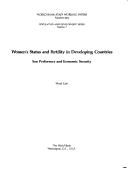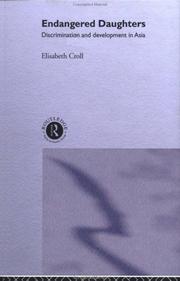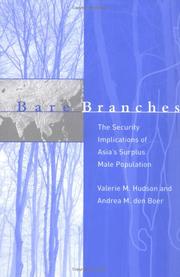| Listing 1 - 9 of 9 |
Sort by
|
Book
ISBN: 9811633185 9811633177 Year: 2021 Publisher: Gateway East, Singapore : Springer,
Abstract | Keywords | Export | Availability | Bookmark
 Loading...
Loading...Choose an application
- Reference Manager
- EndNote
- RefWorks (Direct export to RefWorks)
Sex of children, Parental preferences for. --- Boy preferences of parents --- Children --- Girl preferences of parents --- Parental preferences for sex of children --- Preferences of parents for sex of children --- Parent and child --- Sex discrimination --- Sex preselection --- Parental sex preferences

ISBN: 0821304461 Year: 1984 Publisher: Washington, D.C.
Abstract | Keywords | Export | Availability | Bookmark
 Loading...
Loading...Choose an application
- Reference Manager
- EndNote
- RefWorks (Direct export to RefWorks)
Family size --- Fertility, Human --- Sex of children, Parental preferences for --- Women --- 314.3 <1-772> --- 314.3 <1-772> Vruchtbaarheid. Nataliteit --(demografie)--Onontwikkelde, onderontwikkelde gebieden --- Vruchtbaarheid. Nataliteit --(demografie)--Onontwikkelde, onderontwikkelde gebieden --- Boy preferences of parents --- Children --- Girl preferences of parents --- Parental preferences for sex of children --- Preferences of parents for sex of children --- Parent and child --- Sex discrimination --- Sex preselection --- Size of families --- Family planning --- Economic conditions --- Parental sex preferences --- Zonder onderwerpscode

ISBN: 1134538839 0203170210 0203132289 1280401222 9780203170212 9780203132289 9786610401222 6610401225 0415247640 0415247659 9780415247641 9780415247658 9781134538836 9781280401220 9781134538782 9781134538829 1134538820 Year: 2000 Publisher: London New York Routledge
Abstract | Keywords | Export | Availability | Bookmark
 Loading...
Loading...Choose an application
- Reference Manager
- EndNote
- RefWorks (Direct export to RefWorks)
This unique and groundbreaking book seeks to re-focus gender debate onto the issue of daughter discrimination - a phenomenon still hidden and unacknowledged across the world.It asks the controversial question of why millions of girls do not appear to be surviving to adulthood in contemporary Asia. In the first major study available of this emotive and sensitive issue, Elisabeth Croll investigates the extent of discrimination against female children in Asia and shifts the focus of attention firmly from son-preference to daughter-discrimination.This book brings together demograph
Family size --- Sex of children, Parental preferences for --- Girls --- Daughters --- Sex discrimination --- Women in development --- Discrimination, Sexual --- Gender discrimination --- Sexual discrimination --- Discrimination --- Sexism --- Gender mainstreaming --- Families --- Women --- Children --- Females --- Young women --- Boy preferences of parents --- Girl preferences of parents --- Parental preferences for sex of children --- Preferences of parents for sex of children --- Parent and child --- Sex preselection --- Size of families --- Family planning --- Social conditions. --- Parental sex preferences
Book
ISBN: 1760462438 176046242X Year: 2018 Publisher: ANU Press
Abstract | Keywords | Export | Availability | Bookmark
 Loading...
Loading...Choose an application
- Reference Manager
- EndNote
- RefWorks (Direct export to RefWorks)
"The practice of sex-selective abortion is on the rise globally, stirring debates about gender inequality, medical ethics and reproductive autonomy. This book is the first ethnography to document practices of sex selection in Viet Nam. It shows how and why abortions are used to select the sex of children and how Vietnamese individuals and health professionals are implicated in this illicit and controversial practice. Telling the stories of women who have undergone sex-selective abortions, it traces their passage through sex determination and abortion decision-making phases, and investigates their experiences during and after their sex-selective abortions. It describes the turmoil experienced by individuals who undergo such abortions and explores their interactions with the spectrum of social actors and health institutions that facilitate practices of sex selection.As the first ethnographic study on sex-selective abortions in Viet Nam, this book delves into socially sensitive terrain and sheds light on personally fraught individual experiences of reproductive agency. It documents societal responses to sex-selective abortions in Viet Nam and identifies gaps in the state’s capacity to regulate reproductive desire in a marketised economy. A resource for researchers, it contributes to ongoing debates on sex selection and provides a framework for developing relevant social policies, interventions and support services.‘This pioneering study offers a nuanced and sensitive account of sex-selective abortion as human experience. Through thought provoking case studies, the book provides rare ethnographic documentation of the complex quandaries that arise as selective reproductive technologies are routinised across the globe.’— Tine M. Gammeltoft, Department of Anthropology, University of Copenhagen"
Abortion --- Sex of children, Parental preferences for --- Sex preselection. --- Moral and ethical aspects --- Social aspects --- Choice of sex of offspring --- Preselection of sex --- Sex --- Sex control (Preselection) --- Sex predetermination --- Sex selection --- Boy preferences of parents --- Children --- Girl preferences of parents --- Parental preferences for sex of children --- Preferences of parents for sex of children --- Parent and child --- Sex discrimination --- Sex preselection --- Abortion, Induced --- Feticide --- Foeticide --- Induced abortion --- Pregnancy termination --- Termination of pregnancy --- Birth control --- Fetal death --- Obstetrics --- Reproductive rights --- Cause and determination --- Parental sex preferences --- Surgery --- Anthropology --- Sex-selection --- Social Policy --- Health Policy
Book
ISBN: 1503603008 9781503603004 9781503600898 1503600890 9781503602939 1503602931 Year: 2017 Publisher: Stanford, California : ©2017 Stanford University Press,
Abstract | Keywords | Export | Availability | Bookmark
 Loading...
Loading...Choose an application
- Reference Manager
- EndNote
- RefWorks (Direct export to RefWorks)
"China's patrilineal and patriarchal tradition has encouraged a long-standing preference for male heirs within families. Coupled with China's birth-planning policy, this has led to a severe gender imbalance. But a counterpattern is emerging in rural China where a noticeable proportion of young couples have willingly accepted having a single daughter. They are doing so even as birth-planning policies are being relaxed and having a second child, and the opportunity of having a son, is a new possibility. Choosing Daughters explores this critical, yet largely overlooked, reproductive pattern emerging in China's demographic landscape. Lihong Shi delves into the social, economic, and cultural forces behind the complex decision-making process of these couples to unravel their life goals and childrearing aspirations, the changing family dynamics and gender relations, and the intimate parent-daughter ties that have engendered this drastic transformation of reproductive choice. She reveals a leading-edge social force that fosters China's recent fertility decline, namely pursuit of a modern family and successful childrearing achieved through having a small family. Through this discussion, Shi refutes the conventional understanding of a universal preference for sons and discrimination against daughters in China and counters claims of continuing resistance against China's population control program."--Publisher's website.
Rural families --- Sex of children, Parental preferences for --- Daughters --- Boy preferences of parents --- Children --- Girl preferences of parents --- Parental preferences for sex of children --- Preferences of parents for sex of children --- Parent and child --- Sex discrimination --- Sex preselection --- Farm families --- Families --- Women --- Social conditions. --- Parental sex preferences --- Family size --- Social change --- S11/0484 --- S11/0702 --- S11/0730 --- Size of families --- Family planning --- Social conditions --- China: Social sciences--Rural life, rural studies: since 1976 --- China: Social sciences--Clan and family in transition: since 1949 --- China: Social sciences--Women and gender: since 1949 --- China --- Rural conditions. --- Familles rurales --- Sexe des enfants --- Filles --- Familles --- Changement social --- Préférences parentales --- Conditions sociales --- Dimension --- Chine --- Conditions rurales

ISBN: 0415247640 0415247659 Year: 2000 Publisher: London Routledge
Abstract | Keywords | Export | Availability | Bookmark
 Loading...
Loading...Choose an application
- Reference Manager
- EndNote
- RefWorks (Direct export to RefWorks)
Family size --- Sex of children, Parental preferences for --- Girls --- Daughters --- Sex discrimination --- Women in development --- Discrimination sexuelle --- Femmes dans le développement --- Social conditions --- S11/0730 --- S11/0731 --- China: Social sciences--Women: since 1949 --- China: Social sciences--Childhood, youth --- Femmes dans le développement --- Physiology: reproduction & development. Ages of life --- Developmental psychology --- Sociology of minorities --- Sociology of the family. Sociology of sexuality --- Human rights --- Asia --- Boy preferences of parents --- Children --- Girl preferences of parents --- Parental preferences for sex of children --- Preferences of parents for sex of children --- Parent and child --- Sex preselection --- Discrimination, Sexual --- Gender discrimination --- Sexual discrimination --- Discrimination --- Sexism --- Gender mainstreaming --- Females --- Young women --- Size of families --- Family planning --- Families --- Women --- Parental sex preferences --- Contraception --- Gender --- Family --- Sex --- Book
Book
ISBN: 9780295999210 9780295742946 0295742941 9780295999203 0295999209 Year: 2018 Publisher: Seattle : University of Washington Press,
Abstract | Keywords | Export | Availability | Bookmark
 Loading...
Loading...Choose an application
- Reference Manager
- EndNote
- RefWorks (Direct export to RefWorks)
This book breaks new ground on the evolution and present technologies and practices of lifestyle sex selection, builds on and critiques feminist and STS theories of reproduction to develop the new concept of biopopulationism, and engages with the messy politics of sex selection in the United States.
Sex preselection --- Human reproductive technology --- Sex of children, Parental preferences for. --- Feminism. --- Science --- Emancipation of women --- Feminist movement --- Women --- Women's lib --- Women's liberation --- Women's liberation movement --- Women's movement --- Social movements --- Anti-feminism --- Science and society --- Sociology of science --- Boy preferences of parents --- Children --- Girl preferences of parents --- Parental preferences for sex of children --- Preferences of parents for sex of children --- Parent and child --- Sex discrimination --- Choice of sex of offspring --- Preselection of sex --- Sex --- Sex control (Preselection) --- Sex predetermination --- Sex selection --- Sex of children, Parental preferences for --- Social aspects. --- Emancipation --- Parental sex preferences --- Cause and determination --- Sexuelle Selektion --- Reproduktionsmedizin --- Sociological Factors. --- Reproductive Techniques, Assisted --- Sex Preselection --- ethics. --- Motiv --- Sexuelle Auslese --- Natürliche Auslese --- Feminism --- Gender --- Prenatal diagnostics --- Reproductive technology --- Book

ISBN: 0262083256 9780262083256 0262582643 9780262582643 Year: 2004 Publisher: Cambridge, Mass. MIT Press
Abstract | Keywords | Export | Availability | Bookmark
 Loading...
Loading...Choose an application
- Reference Manager
- EndNote
- RefWorks (Direct export to RefWorks)
"What happens to a society that has too many men? In this book, Valerie Hudson and Andrea den Boer argue that, historically, high male-to-female ratios often trigger domestic and international violence. Most violent crime is committed by young unmarried males who lack stable social bonds. Although there is not always a direct cause-and-effect relationship, these surplus men often play a crucial role in making violence prevalent within society. Governments sometimes respond to this problem by enlisting young surplus males in military campaigns and high-risk public works projects. Countries with high male-to-female ratios also tend to develop authoritarian political systems."--Jacket.
Sociology of the family. Sociology of sexuality --- Asia --- Sex discrimination against women --- Sex of children, Parental preferences for --- Sex distribution (Demography) --- Social conflict. --- Discrimination à l'égard des femmes --- Répartition par sexe (Démographie) --- Conflits sociaux --- Social aspects. --- S11/1050 --- S11/1070 --- S11/1040 --- S11/1005 --- S09/0264 --- -Sex of children, Parental preferences for --- -Sex distribution (Demography) --- -Social conflict --- Class conflict --- Class struggle --- Conflict, Social --- Social tensions --- Interpersonal conflict --- Social psychology --- Sociology --- Boy preferences of parents --- Children --- Girl preferences of parents --- Parental preferences for sex of children --- Preferences of parents for sex of children --- Parent and child --- Sex discrimination --- Sex preselection --- Gender distribution (Demography) --- Demography --- Discrimination against women --- Subordination of women --- Women, Discrimination against --- Feminism --- Women's rights --- Male domination (Social structure) --- China: Social sciences--Family planning --- China: Social sciences--One child policy --- China: Social sciences--Population, demography: China: since 1949 --- China: Social sciences--Population, demography: China --- China: Foreign relations and world politics--General works: since 1989 --- Social aspects --- Parental sex preferences --- Discrimination à l'égard des femmes --- Répartition par sexe (Démographie) --- Social conflict --- Bevölkerungsentwicklung --- Bevölkerungsentwicklung. --- Demographische Transition --- Geschlechtsverhältnis. --- Männliche Jugend. --- Security, International. --- Sex discrimination against women. --- Sex distribution (Demography). --- Sex of children, Parental preferences for. --- Sicherheit --- Sicherheitspolitik. --- Sozialer Konflikt. --- Young men --- Geschlechtsverhältnis --- Junger Mann --- Sicherheit (Aussenpolitik) --- (Aussenpolitik) --- Asia. --- China --- Indien --- Population. --- Sicherheit (Aussenpolitik).
Book
ISBN: 134957144X 1137520507 1137550805 Year: 2016 Publisher: New York : Palgrave Macmillan US : Imprint: Palgrave Macmillan,
Abstract | Keywords | Export | Availability | Bookmark
 Loading...
Loading...Choose an application
- Reference Manager
- EndNote
- RefWorks (Direct export to RefWorks)
One of the widely acknowledged consequences of the economic reforms in China over the past four decades has been widened social-gender gap and hence increased gender inequalities. In recent years, there is a rising concern of inequality in China and a mounting intellectual reflection and critique of the growth-focused development path China has followed so far. This collection can be seen as a part of this critique, but the focus is on gender and various forms of inequality pertaining to gender and gender relations. The book shows how various gender inequality issues are approached and analysed in the location of China by Chinese gender/social science scholars and how studies of gender inequality constitutes an astute critique of the neo-liberal capitalist development in China. The book brings forth a distinctive gender perspective to the Chinese intellectual and political analysis of social inequality and a Chinese perspective to the bulks of international scholarship on gender inequality in China.
Sex role --- Sex discrimination in employment --- Sex of children, Parental preferences for --- Gender Studies & Sexuality --- Gender & Ethnic Studies --- Social Sciences --- China --- Social conditions --- Boy preferences of parents --- Children --- Girl preferences of parents --- Parental preferences for sex of children --- Preferences of parents for sex of children --- Gender role --- Parental sex preferences --- Social sciences. --- Ethnology --- Communication. --- Feminist theory. --- Sociology. --- Cultural studies. --- Sex (Psychology). --- Gender expression. --- Gender identity. --- Social Sciences. --- Gender Studies. --- Feminism. --- Asian Culture. --- Media Studies. --- Cultural Studies. --- Sex identity (Gender identity) --- Sexual identity (Gender identity) --- Identity (Psychology) --- Sex (Psychology) --- Queer theory --- Expression, Gender --- Psychology, Sexual --- Sex --- Sexual behavior, Psychology of --- Sexual psychology --- Sensuality --- Social theory --- Social sciences --- Feminism --- Feminist philosophy --- Feminist sociology --- Theory of feminism --- Communication, Primitive --- Mass communication --- Sociology --- Behavioral sciences --- Human sciences --- Sciences, Social --- Social science --- Social studies --- Civilization --- Asia. --- Psychological aspects --- Philosophy --- Parent and child --- Sex discrimination --- Sex preselection --- Employment (Economic theory) --- Sex role in the work environment --- Sexual division of labor --- Women --- Sex differences (Psychology) --- Social role --- Gender expression --- Sexism --- Employment --- Ethnology-Asia. --- Ethnology—Asia. --- Popular culture --- Study and teaching --- Cultural studies --- Study and teaching.
| Listing 1 - 9 of 9 |
Sort by
|

 Search
Search Feedback
Feedback About UniCat
About UniCat  Help
Help News
News